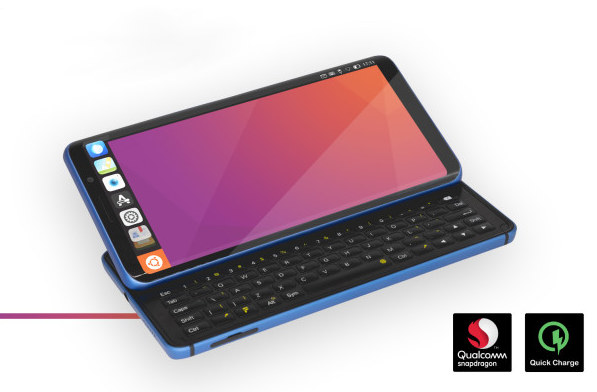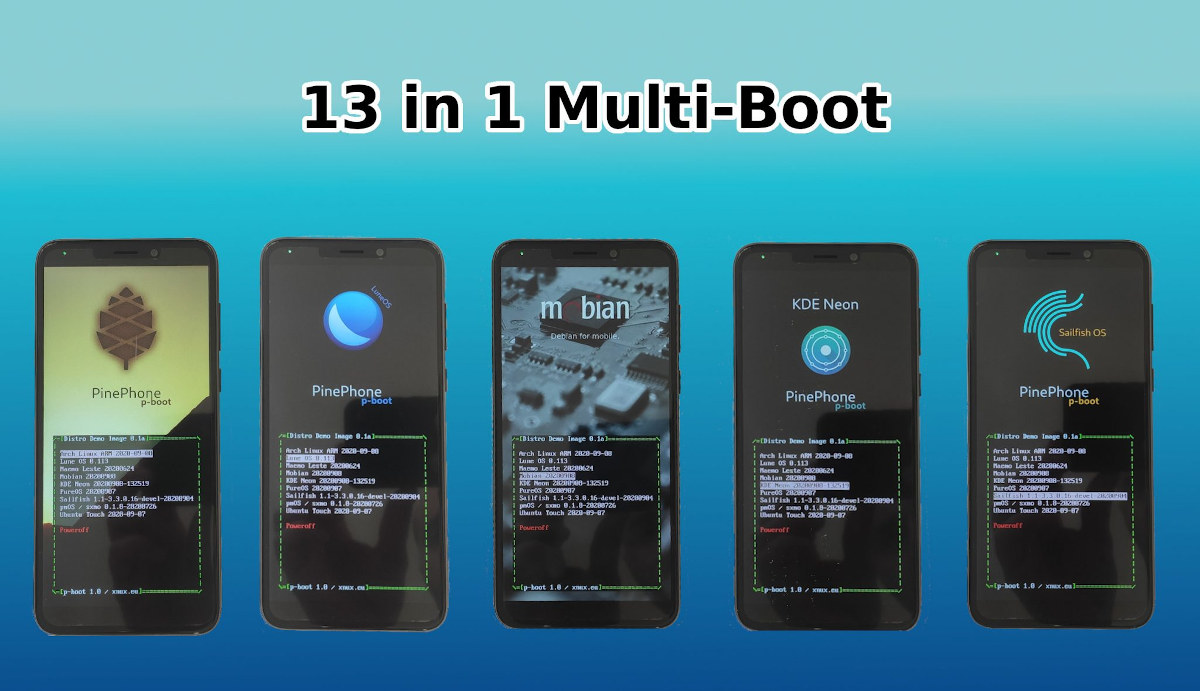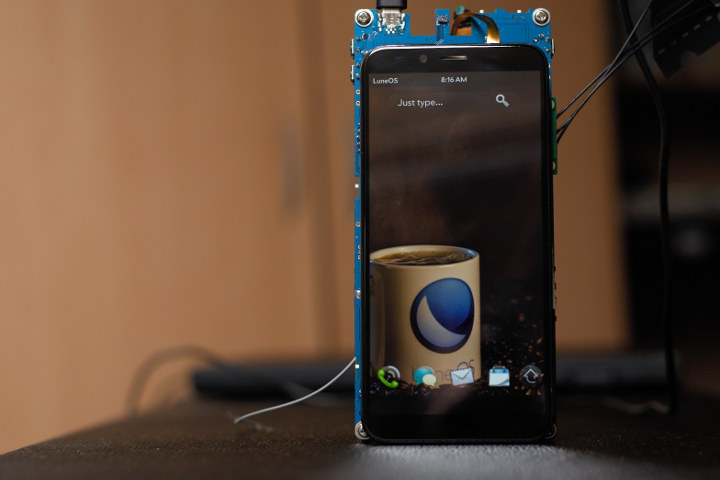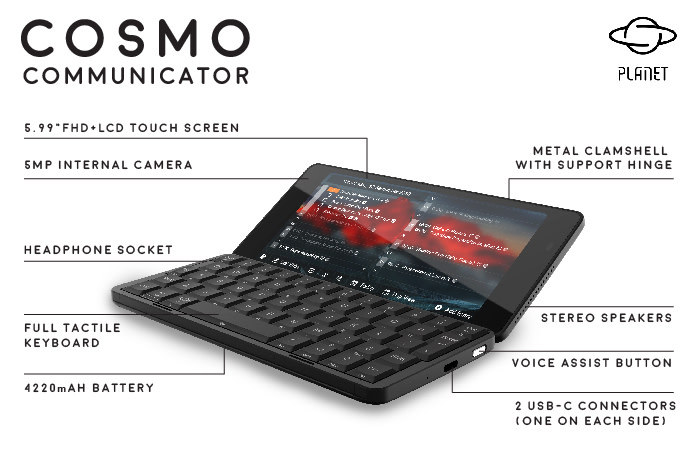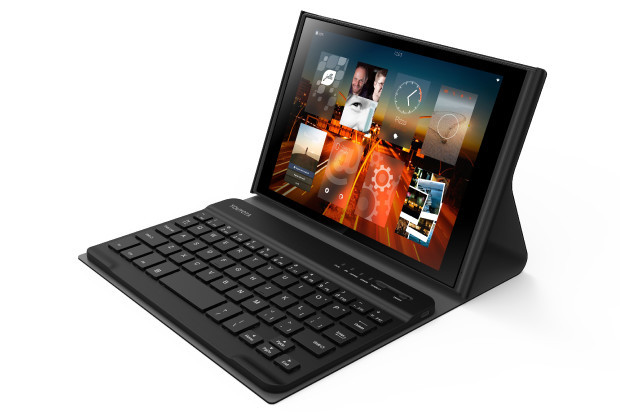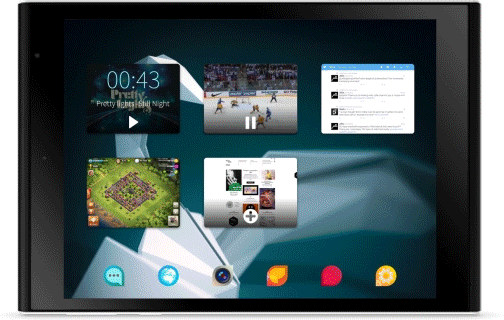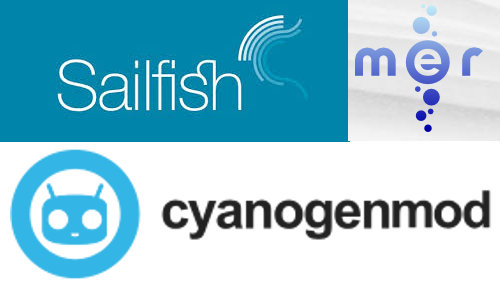F(x)tec Pro1 Android smartphone was introduced last year with the main differentiating features being its sliding keyboard. The company also mentioned support for Android-based LineageOS as well as Sailfish OS, but those need(ed) to be installed by the user. FX Technology has now unveiled F(x)tec Pro1 X smartphone with similar specs, except for the blue case and the option of having additional memory and storage, as well as official support for LineageOS and Ubuntu Touch thanks to a collaboration with XDA. Another difference is the availability of Scandinavian and AZERTY keyboard layouts F(x)tec Pro1 X specifications: SoC – Qualcomm Snapdragon 835 (MSM8998) octa-core Kryo 280 processor with 4x higher performance cores @ 2.45 GHz, 4x low-power cores @ 1.9 GHz, Adreno 540 GPU System Memory – 6GB or 8GB LPDDR4 Storage – 128GB or 256GB flash, MicroSD card up to 2TB Display – 5.99-inch 2160 x 1080 (FHD+) AMOLED display with […]
Pinephone Multiboot Image Boots 13 Different Linux Distributions
You’ve certainly heard about dual-boot systems with Windows and Linux, and possibly about triple-boot systems with an extra OS like Chromium OS or Android, but pine64’s forum user Megous has gone much further with a multiboot image for Pinephone able to boot 13 different Linux distributions! You’d think the image would occupy a lot of space on the device, but since all 13 distributions share the same Linux 5.9 kernel, all 13 operating systems fit on the internal eMMC flash or a MicroSD card with 8GB or greater capacity. The image is based on the p-boot bootloader allowing you to select the distribution of your choice and supports all PinePhones from the Braveheart Edition to the most recent revisions with 3GB RAM and 32GB storage. So what Linux distributions are supported by the multiboot image exactly? Here’s the list: Arch Linux Arm 2020-09-08 Lune OS 0.113 Maemo Leste 20200906 Mobian […]
Software Development on Librem 5 and PinePhone Linux Phones is Progressing Nicely
Several Linux phones are expected this year including Purism Librem 5 and Pine64 PinePhone. Both companies have sent phone development kits out to developers a few months ago, and we are starting to see some nice progress for both phones. What made me write this post is an update from Purism comparing the boot time on Librem 5 running PureOS Linux distribution without specific optimizations yet, and HTC One Android smartphone. Librem 5 smartphone devkit takes 13 seconds to get to the lockscreen, while the Android phone takes over 40 seconds. Fair enough, most people won’t boot their phone often, but it still nice to know it won’t take long to turn on the phone from power off state. They also posted a progress report at the end of May saying calls are now working with better audio quality, fixed various issue with messaging in Chatty, work on Linux […]
Cosmo Communicator 2-in-1 Smartphone & Pocket Computer Runs Android 9, Linux
In recent years, we’ve started to see Windows 10 mini laptops with 6″ to 8″ display and a foldable keyboard coming to market thanks to products such as GPD Pocket 2 or One Mix 2 Yoga. They offer a full Windows 10 experience in an ultra-small form factor, but you’d still need to carry your phone around with you for things like calls or SMS. Cosmo Communicator offers a similar experience, but instead of relying on Intel processor and Windows, the device comes with a Mediatek P70 mobile processor capable of running Android 9 Pie or Linux distributions merging phone and mini laptop functionalities into a single device. Cosmo Communicator preliminary specifications: SoC – Mediatek P70 octa-core processor with four Arm Cortex A73 cores @ up to 2.0GHz, four Cortex A53 cores @ up to 2.0GHz, Arm Mali G72 MP3 GPU @ 800MHz, and a Dual-core mobile AI processor (APU) […]
Jolla Tablet Take 2 – Youyouta Tablet Runs Linux Based Sailfish OS 2.1 Operating System (Crowdfunding)
Jolla Tablet running Linux based Sailfish OS was launched in 2014 via Indiegogo, and the campaign was initially very successful having raised over 2.5 million dollars, but eventually it became a disaster as the company had some financial issues, and the tablet was canceled with on a few backers having received their tablet. The company eventually organized a refund program, so it did not end up being as bad as it first seemed. But there’s now a “new” SailFish OS tablet – Youyouta tablet – that has been launched on Indiegogo last month. Jolla is not handling the manufacturing and campaign, and instead it’s done by a third party who is paying license fees to Jolla for Sailfish OS. They re-used most parts of the hardware design from original Jolla tablet plus a few modifications like option for higher storage capacity: SoC – Intel Atom Z3735F quad core “Bay Trail” […]
Jolla Opens Sailfish OS 2.0 for Licensing, Unveils Sailfish Secure, Plans Atom x3 Support
As the Jolla Tablet running Sailfish OS 2.0 is about to ship to Kickstarter backers (Q2 2015), the company has issues a press release announcing Sailfish OS 2.0 is now ready for licensing to OEMs and other partners, and OS porting is being done to the newly announced Intel Atom x3 processors. Sailfish OS 2.0 has been designed for both smartphones and tablets with the following key changes and improvements: Stronger technical OS core and improved Android application compatibility Support for Intel architecture, including the Intel Atom x3 processor Best multitasking on the market for both smartphones and tablets Improved user experience with an enhanced, even richer user interface Strong privacy and personalization features Many new UI/UX features, like enhanced notifications and events views, and even simpler swipe access to main functions Sailfish 2.0 is designed to provide premium visibility in the UI for leading digital content providers and to […]
$249 Jolla Tablet Runs Sailfish OS 2.0 on a Quad Core Intel Processor (Crowdfunding)
After launching the Jolla phone last year, Jolla has now unveiled the Jolla Tablet running the company’s Sailfish OS, and just like Nokia N1, powered by a quad core Intel processor. Instead of directly using a pre-order system like with the Jolla smartphone, they’ve decided to launch an Indiegogo campaign, and price the tablet much more aggressively than the phone, as perks started at just $189 for early backers. Jolla tablet specifications: SoC – Unnamed Intel 64-bit quad core processor @ 1.8 GHz, which should be Z3740(D), Z3745(D) or Z3560 processor. System Memory – 2GB DDR3L-RS Storage – 32GB eMMC + micro SD slot up to 32GB Display – 7.85″ IPS display, 2048 x 1536 resolution, 5-point capacitive touch Camera – 5.0MP rear camera, 2.0MP front-facing camera Audio – 3.5mm audio jack + speaker(s)? Connectivity – Dual band 802.11 a/b/g/n Wi-Fi, GPS Sensors – Accelerometer, light sensor, and proximity sensor. […]
Jolla Releases Sailfish OS Hardware Adaptation Development Kit for Android (CyanogenMod)
If you don’t quite have the spare cash to buy a Jolla Phone, or don’t own a Nexus 4, but still want to try Jolla’s Sailfish OS on your smartphone, here’s your chance, as Jolla has just released their “Sailfish OS Hardware Adaptation Development Kit”, which allows you to install Sailfish OS on any Android phone that supports CyanogenMod 10.1. The development kit is comprised of: Mer core – The Linux userspace core Android Hardware Adaptation (HA/HAL), consisting of: Device-specific Android Kernel Binary device drivers taken from an Android ROM (e.g. CyanogenMod) The libhybris interface built against the binary drivers Middleware packages depending on hardware-specific plugins A Qt/Wayland QPA plugin utilizing the Android hwcomposer Sailfish OS component You’ll a smartphone and a build machine matching the following hardware and software pre-requisites: Smartphone ARMv7 Android device officially supported by CyanogenMod 10.1.x Means to do backup and restore of the device contents […]


